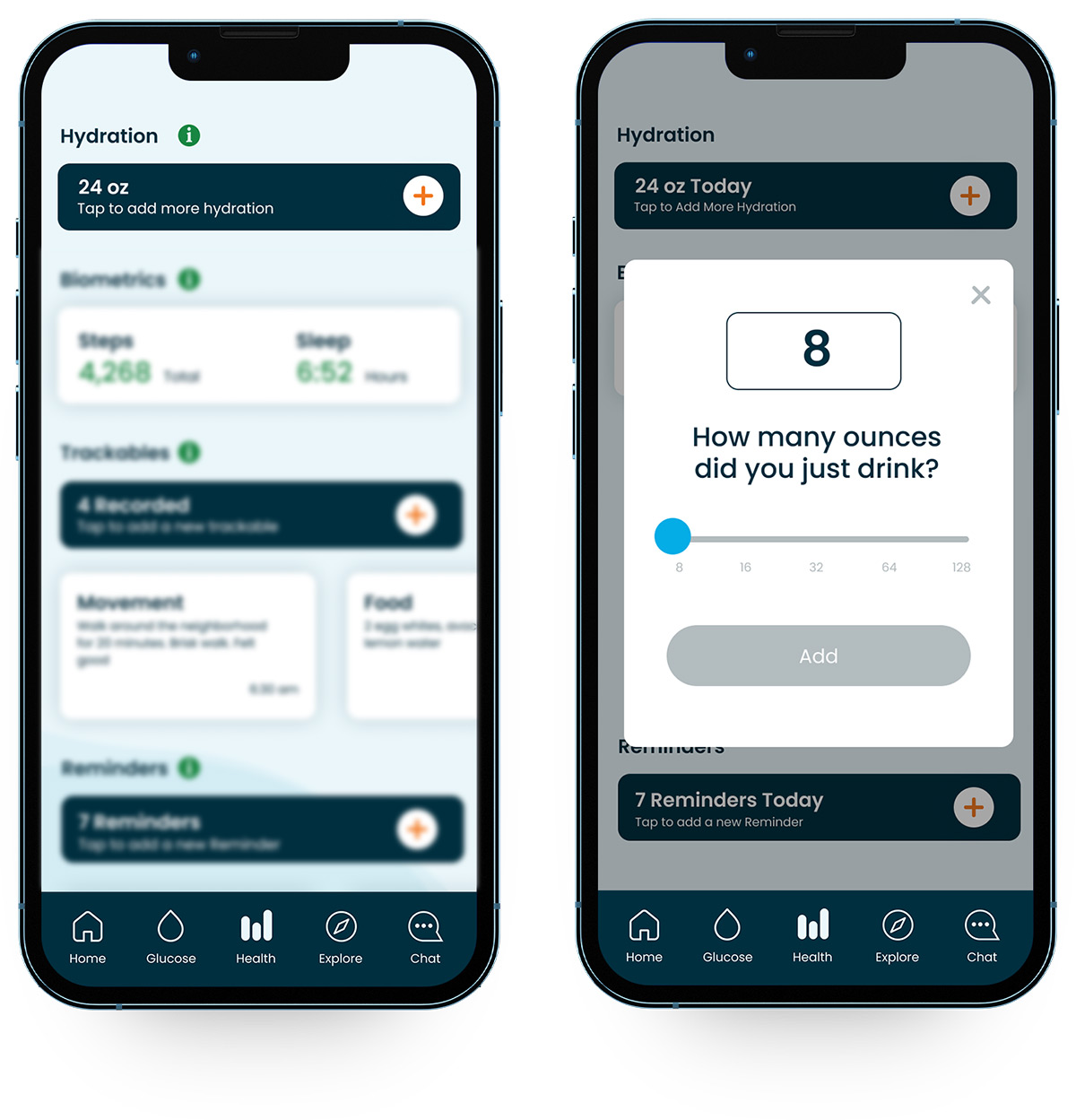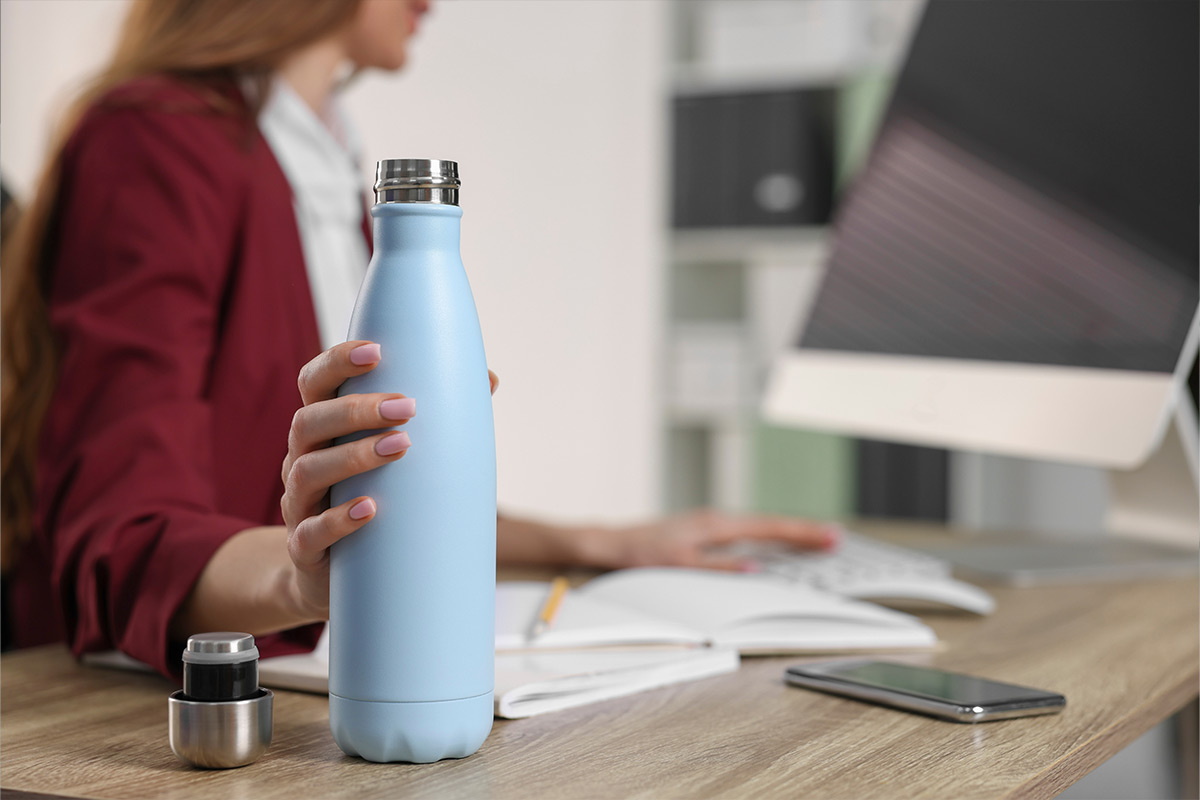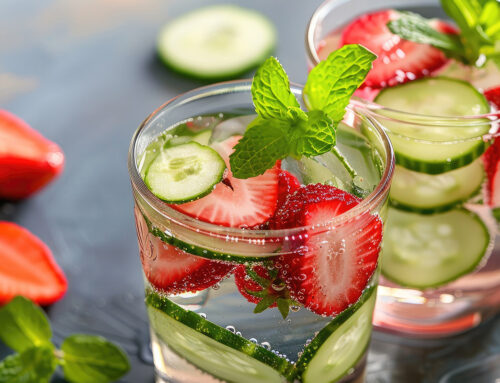Did you know that up to 75% of Americans are chronically dehydrated (1)? That’s 3 out of every 4 people! Staying hydrated is crucial for maintaining energy levels and overall health. It can also help improve blood sugar control and boost metabolism.
What does it mean to be hydrated? Hydration refers to the process of providing your body with the necessary fluids to function properly. Water makes up about 50% of body weight for females and about 60% of body weight for males, and it is essential for various bodily functions. These functions include excretion, breathing, muscle recovery, and brain function. It is so important to your brain that about 80% of your brain is comprised of water! Any time you don’t get enough hydration, it can affect your physical health and even increase your risk for dementia. You can see why it is so vital to our health (2-3)!
Mental & Physical Benefits
“Water is the driving force of all nature”
This quote really sums up just how important water and hydration are for us. It is the driving force behind our mental and physical health. Proper hydration keeps our brain cells happy and leads to increased concentration and cognitive function. Water carries essential nutrients and oxygen to these brain cells, keeping them healthy and active. Research has shown that even mild dehydration can impair brain function and affect mood (4).
Another favorite quote is “drown a cold, drown a fever.” This means drinking lots of water is important when you’re sick. Staying hydrated is crucial when you’re sick, as it supports your immune system and helps flush out toxins. Drinking enough water allows your body to produce lymph, which carries essential nutrients and immune cells to fight infections while removing waste and toxins (10). Dehydration can make lymph thick and sluggish, placing extra strain on the lymphatic system. Water also keeps the mucous membranes in your nose and throat moist, creating a barrier to block germs, and helps regulate body temperature (5). Water plays such a large role in supporting the body’s overall healing process!
Staying properly hydrated is also essential for physical performance and maintaining energy to stay active. Water transports electrolytes, such as sodium, potassium, and magnesium, throughout the body to assist with muscle contractions. When any of these electrolytes are disrupted, it can lead to muscle cramps, fatigue, and even changes in heart rate! Proper hydration ensures that muscles receive enough oxygen and nutrients to maintain activity and movement goals (6). When the body becomes dehydrated, the heart has to work harder to pump blood to deliver oxygen and essential nutrients to the muscles and organs. This can lead to the body feeling fatigued and experiencing decreased motivation. Simply staying hydrated can boost energy production and help the body maintain higher levels of energy throughout the day!
Metabolic Benefits
Water plays a key role in breaking down the food we eat. It helps dissolve minerals, making them more accessible for absorption in the intestines. Enzymes in our digestive system require water to function effectively. These enzymes ensure that food is properly digested. Once the food is digested, water is needed again to assist with the actual chemical reactions that convert this digested food into energy (6). Water is involved in the process called thermogenesis, where the body generates heat and burns calories. When food is not digested properly, it is not efficiently converted into our daily energy needs (6). Without adequate thermogenesis, our metabolic rate (how many calories we burn) is affected. Proper hydration plays a role in supporting the metabolic processes that help the body break down and use fat for energy, rather than storing it.
Research shows that people with diabetes were better able to maintain their glucose levels when well-hydrated compared to when they were dehydrated (7). There are multiple mechanisms in the body that explain why hydration can assist with blood sugar management.
- One of these is through the process of dilution. Increasing fluid intake decreases the concentration of blood glucose (8). This means that by simply drinking more water before and after a meal, you can improve your blood sugar readings!
- Another mechanism of how hydration aids with blood sugar management is through the kidneys. Drinking enough water helps the kidneys filter waste products, including glucose, from the blood. Your kidneys assist with blood sugar control, and blood sugar control helps protect your kidneys! People with diabetes have a much higher risk for kidney disease, and proper hydration is the easiest way to decrease this risk.
- Proper hydration also plays a role in the secretion of hormones that regulate blood sugar, such as arginine vasopressin (AVP). High levels of AVP are associated with increased blood sugar levels and insulin resistance. Staying hydrated can help reduce AVP levels, which supports better glycemic control (8).
Tracking Water Intake
Now that you have a better understanding of how proper hydration can increase energy levels, enhance mental and physical well-being, and even assist with better blood sugar control, how can one ensure proper hydration throughout each day? Tracking your intake is a great first step and can be eye-opening! Not only can it give you an idea of where you currently stand with your water intake, but you can also journal and observe improvement trends in energy and blood sugar as you start to utilize your myTula App and make water intake a “trackable” habit.

To start, set a daily water intake goal that aligns with your individual needs. You might begin with the general guideline of drinking at least eight 8-ounce glasses of water a day, then adjust your water intake based on activity level, climate, and personal health conditions. Using a reusable water bottle with measurements can help you keep track of how much you’re drinking throughout the day.
Another great way to stay hydrated is to incorporate hydrating foods into your diet. Fruits and vegetables, such as cucumbers, oranges, and watermelon, have high water content and can contribute to your overall hydration. Establishing a routine or habit stacking, such as drinking a glass of water first thing in the morning and before each meal, can also help keep you on top of your hydration needs.
Remember to listen to your body and be mindful of signs of dehydration, such as dry mouth, fatigue, headaches, constipation, or dark-colored urine. Monitoring these signals can prompt you to increase your fluid intake when necessary. With these strategies in place, you’ll be well on your way to maintaining optimal hydration and reaping the numerous health benefits that come with it.
Hydration Myths Debunked
For some fun trivia, here are some debunked hydration myths!
- Myth 1: Everyone Should Drink 8 Glasses of Water a Day
Truth: Individual hydration needs vary based on factors such as age, activity level, and climate. While some studies recommend drinking half of your body weight in ounces, others suggest starting with 8 cups and gradually increasing to half your body weight in ounces (10, 13). Due to various factors, such as medications and certain medical diagnoses, it’s important to consult your healthcare provider to determine the best hydration plan for you.
- Myth 2: Thirst is the Best Indicator of Hydration
Truth: Thirst is a late indicator of dehydration; it’s better to drink water regularly throughout the day. Also note, sometimes thirst disguises itself as hunger! If you are hungry for a snack, try drinking a glass of water first and see if that satisfies your craving.
- Myth 3: You Can’t Drink Too Much Water
Truth: Overhydration can lead to a condition where sodium levels in the blood become dangerously low. However, this is difficult to do if you are also maintaining a healthy diet full of produce and a little salt. This type of diet provides a great balance between potassium and sodium. These electrolytes prevent your body from having dangerously low levels of sodium. If you are consuming at least ½ ofr your body weight in ounces of water each day, make sure you are adding electrolytes to your water to prevent overhydration. Ask your provider or dietitian what the right recommendation for you would be. If you have other conditions such as heart failure or kidney disease, please consult with your provider and ask if they recommend a fluid restriction.
- Myth 4: Sports Drinks are the Best Way to Rehydrate
Truth: For most people, plain water is sufficient for hydration. Sports drinks are only necessary for intense exercise lasting over an hour. Even then, homemade sports drinks are much healthier and better for blood sugar. Something as simple as ¼ cup of coconut water and a pinch of salt in ¾ cup of water post-60-minute workout would suffice for most people.
- Myth 5: Drinking Water is the Only Way to Stay Hydrated
Truth: Water-rich foods like fruits and vegetables also contribute to hydration. Add leafy green vegetables, melons, grapefruit, berries, and/or peaches to your routine each day to improve hydration.
- Myth 6: Clear Urine is a Sign of Good Hydration
Truth: Light yellow urine is a better indicator of proper hydration. It shows that you are well-hydrated AND have a proper balance of electrolytes. When urine becomes clear, it can potentially mean that there is an electrolyte imbalance.
There are many myths out in the world about water, but this you can take away as true – water is essential for your overall health and energy levels. Consider talking to your HealthCoach and start tracking your intake today!
Sending Health Your Way!
The Tula Clinical Team
Austin MS, RDN, CSR, LDN, CD
Aubree RN, BSN
Tula Takeaways |
|---|
| 1. Trackable Challenge: Use your myTula App to compare your energy levels and water intake on a day-to-day basis. |
| 2. Tell a Friend: Consider telling a friend about your hydration goals. This can help both of you recognize the importance of hydration, and you can work on it together. |
| 3. Stay on Top of It: Remember, thirst is a delayed reaction to dehydration. Make sure you stay ahead of this by drinking adequate water throughout the day. Try drinking at least 20 oz of water first thing in the morning and between each meal to guard against dehydration. |
The LIVE TULA blog is informational and not medical advice. Always consult your doctor for health concerns. LIVE TULA doesn’t endorse specific tests, products, or procedures. Use the information at your own risk and check the last update date. Consult your healthcare provider for personalized advice.







